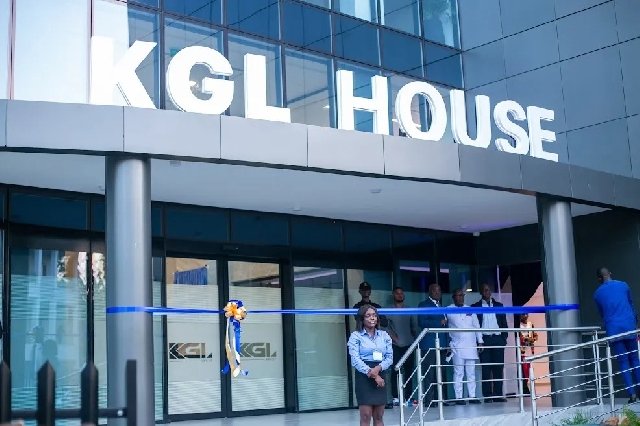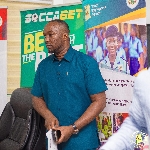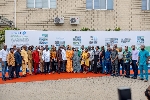KGL Technology defends record amid calls to review NLA contracts
 KGL office in Labone
KGL office in Labone
KGL Technology Limited, widely regarded as the most accomplished Lotto Marketing Company (LMC) in Africa, has issued a strong rebuttal to recent media reports suggesting that its partnership with the National Lottery Authority (NLA) should be suspended and reviewed.
This follows claims attributed to the Financial and Business Services Employees Union (FBSEU), reportedly representing staff of the NLA, who have petitioned the Attorney-General and the newly appointed Director-General of the Authority to suspend all third-party contracts and licenses granted to Private Lotto Operators (PLOs).
However, a detailed response from the Digital Public Policy Forum, a research body tracking the evolution of Ghana’s lottery sector, has sought to correct what it describes as “misconceptions and false narratives” surrounding the licensing regime and operations of KGL and the NLA.
The Forum clarified that KGL Technology Limited is not a Private Lotto Operator (PLO) but a licensed Online Lotto Marketing Company, operating under Sections 5 to 10 of the National Lotto Act, 2006 (Act 722) and the Lottery Regulations, 2008 (L.I. 1948).
KGL operates exclusively online and contributes over GH₵250 million annually to the NLA, the Ghana Revenue Authority, and the Consolidated Fund — at no cost or risk to the Authority.
Ghana’s digital lottery history dates back to 2006 when NLA partnered with Simnet Ghana Limited to introduce automated machines for ticketing.
While initial transitions from manual to automated systems faced resistance, they proved essential in addressing fraud and inefficiencies.
Despite several attempts, including the failed "Mobi Game 2 Sure" and the *890# short code platform, the NLA struggled to successfully operate digital lottery services.
It wasn't until KGL’s intervention in 2019 that the Authority found success in digital lottery operations.
KGL introduced the *959# platform through a Public-Private Partnership, beginning with a GH₵10 million penalty fee to the NLA for pilot testing.
Following a successful pilot, KGL was granted a provisional license, which, upon expiration, was upgraded to a 10-year exclusive agreement, enabling KGL to shoulder the full cost of digital infrastructure without financial burden to the state.
KGL is ISO/IEC 27001 certified and adheres to the highest standards of security, compliance, and system integrity.
The company does not conduct its own lottery draws, instead relying on NLA's official results for payouts.
Its operations have consistently met financial obligations and provided critical support to the NLA, including marketing sponsorships and infrastructure refurbishments such as the Brennan Hall.
Notably, the Forum claims that 90% of NLA’s current revenue is attributable to the KGL platform.
The Forum emphasized that NLA's business model has historically relied on private partnerships, including Lotto Marketing Companies and Technical Service Providers such as Lots-Services Ghana Limited and Simnet Ghana Limited.
It added that these entities have worked with the NLA for over 25 years.
It further argued that many PLOs licensed under Act 722 operate in contradiction to legal frameworks, which instead mandate licensing under the Veterans Administration Ghana (VAG) Act, 2006 (Act 721).
Therefore, calls to suspend legally compliant operators such as KGL are unjustified.
The Digital Public Policy Forum praised the KGL-NLA partnership for aligning with Ghana’s broader digitalization agenda, reducing illegal lottery operations, and minimizing social stigma associated with public staking.
It criticized ongoing attempts to discredit the partnership as politically motivated, citing similar resistance during the previous administration under President Akufo-Addo.
“The NLA does not belong to any political party or private group — it belongs to the people of Ghana,” the statement read.
“Any entity delivering real value to the sector and the country should be supported, not undermined.”
The Forum concluded that any concerns about contractual breaches should be addressed through appropriate legal channels and not through public campaigns or petitions that risk undermining successful public-private partnerships.
Source: Classfmonline.com/Cecil Mensah
Trending Business

IACG targets 1,000 market traders and artisans in the Western and Western North Regions as part 2025 micro business clinics
10:28
Basintale blocks renewal of Zoomlion's contract if salary remains GH¢250
13:14
MDF forum pushes for mineral revenues to benefit mining communities
09:38
MPs assure Zoomlion of gov't's prompt debt settlement
11:24
GoldBod begins licensing of gold trading service providers
11:48
President Mahama appoints Capt. James Richmond Quayson as the Director of Takoradi Port
13:10
Replicate Kwahu Business Forum nationwide- UCC don to Mahama
09:27
Better Ghana Alliance rebuts DPPF’s hailing of KGL as Africa’s top lotto company
09:13
New policies will hurt mining sector growth - Minority to gov’t
08:27
Ato Forson leads Ghana to participate in first IMF /World Bank Spring Meetings in Washington DC
02:50




